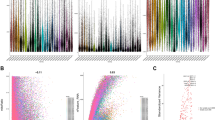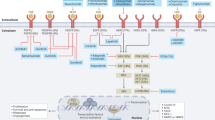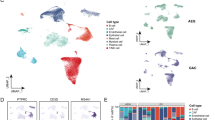Abstract
Aberrant transcripts of FHIT (fragile histidine triad) have been reported in several types of primary tumors and cell lines, including gastric carcinoma. The role of these aberrant transcripts in tumorigenesis is not clear yet. Forty-eight aberrant-sized FHIT transcripts with various lengths and number in 35 cases of gastric adenocarcinomas were further characterized. Aberrant transcripts, with deletions and/or insertions, were frequently observed in 20 cases of tumors. Sequence analysis demonstrated that different types of aberrant transcripts used normal splice sites but skipped exons, contained the inserts with the part of intron 5 sequences, or used the FHIT cDNA sequence 179-180 as a cryptic splice acceptor site. Most of aberrant transcripts lacked exon 5 and were presumably non-functional as the translation initiation codon is located in exon 5. Additionally, other transcripts, indicative of additional splice processing, either deletions or insertions, were expressed in several tumors. Taken together, our data indicate that the FHIT gene expression is frequently altered in gastric adenocarcinomas by aberrant splicing, and suggest that different types of aberrant transcripts may result during the multi-step splice processing.
Similar content being viewed by others
Article PDF
Author information
Authors and Affiliations
Rights and permissions
This is an Open Access article distributed under the terms of the Creative Commons Attribution Non-Commercial License (http://creativecommons.org/licenses/by-nc/3.0/) which permits unrestricted non-commercial use, distribution, and reproduction in any medium, provided the original work is properly cited.
About this article
Cite this article
Lee, SH., Kim, CJ., Park, HK. et al. Characterization of aberrant FHIT transcripts in gastric adenocarcinomas. Exp Mol Med 33, 124–130 (2001). https://doi.org/10.1038/emm.2001.22
Published:
Issue date:
DOI: https://doi.org/10.1038/emm.2001.22
Keywords
This article is cited by
-
Fragile histidine triad protein: structure, function, and its association with tumorogenesis
Journal of Cancer Research and Clinical Oncology (2010)
-
Loss of Fhit expression is associated with poorer survival in gastric cancer but is not an independent prognostic marker
Journal of Cancer Research and Clinical Oncology (2006)
-
Loss of FHIT protein expression correlates with disease progression and poor differentiation in gastric cancer
Journal of Cancer Research and Clinical Oncology (2003)



